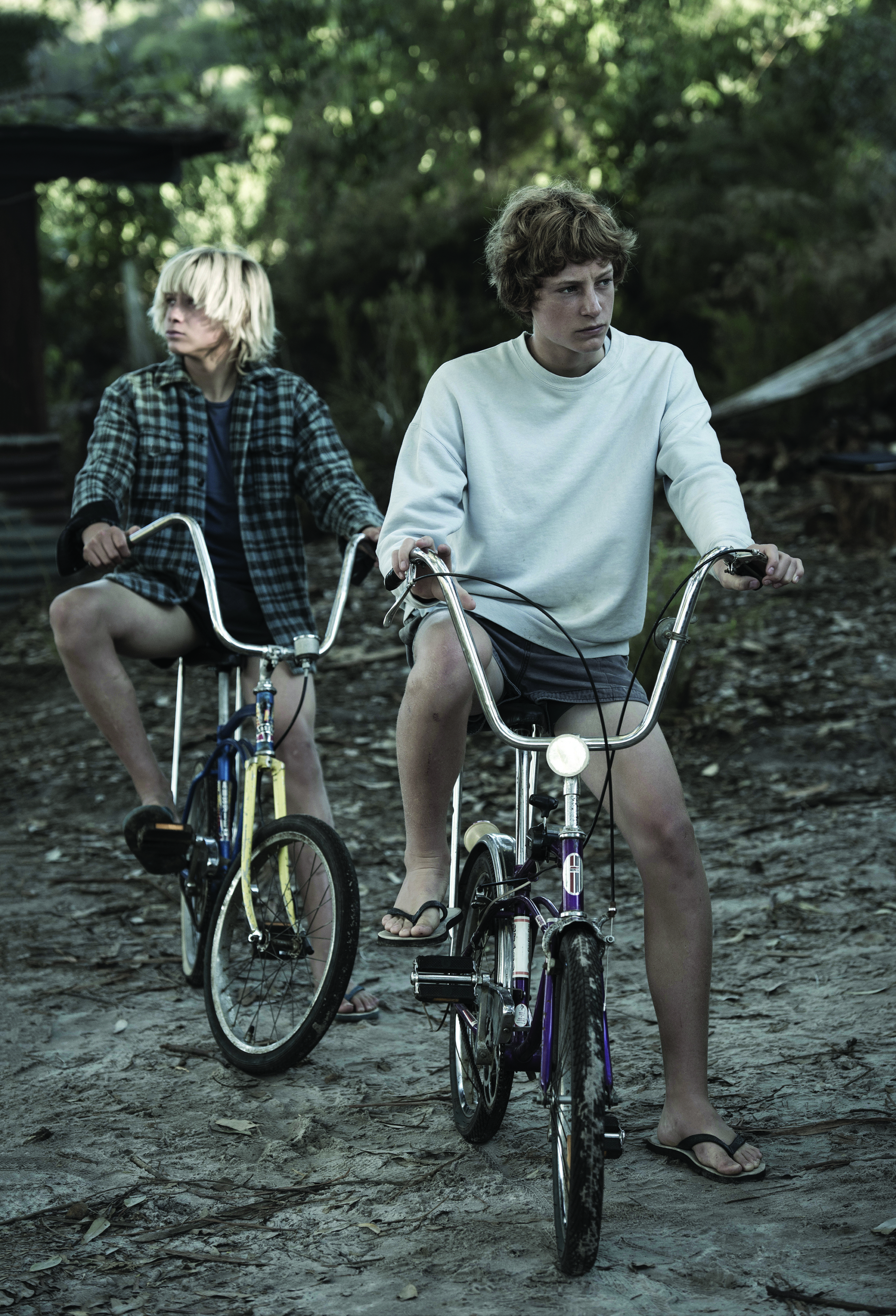The last sucking bubble of consciousness. The rising gorge of panic. Yes, a delicious ricochet of sparks.
I suppose I knew well enough what it felt like. It was intense, consuming, and it could be beautiful. That far out at the edge of things you get to a point where all that stands between you and oblivion is the roulette of body-memory, the last desperate jerks of your system trying to restart itself. You feel exalted, invincible, angelic because you’re totally fucking poisoned. Inside it’s great, feels brilliant. But on the outside it’s squalid beyond imagining.[1]Tim Winton, Breath, Penguin Books, Camberwell, VIC, 2009, p. 234.
The above excerpt, from Tim Winton’s 2008 novel Breath, describes the imagined sensations associated with erotic asphyxiation: the feeling of ‘respiratory acidosis’,[2]ibid., p. 234. whereby one’s blood turns acidic as one’s lungs cry out for air. That toxic transformation – both literal and metaphorical – is central to Winton’s award-winning novel, an Australian coming-of-age story whose characters frequently find themselves struggling for breath at the precipice of human endurance.
On the page, Breath probes the psychic bruises inflicted by an adolescence spent exploring the limits of human experience. On the surface, it’s a story about surfing, about male bonding and its associated competitiveness. But, more significantly, Winton’s book is a story about those bruises – more so how they were inflicted than how they might heal. It’s a story whose power is found in its ambivalence, its exploration of the intangibility of the extraordinary.
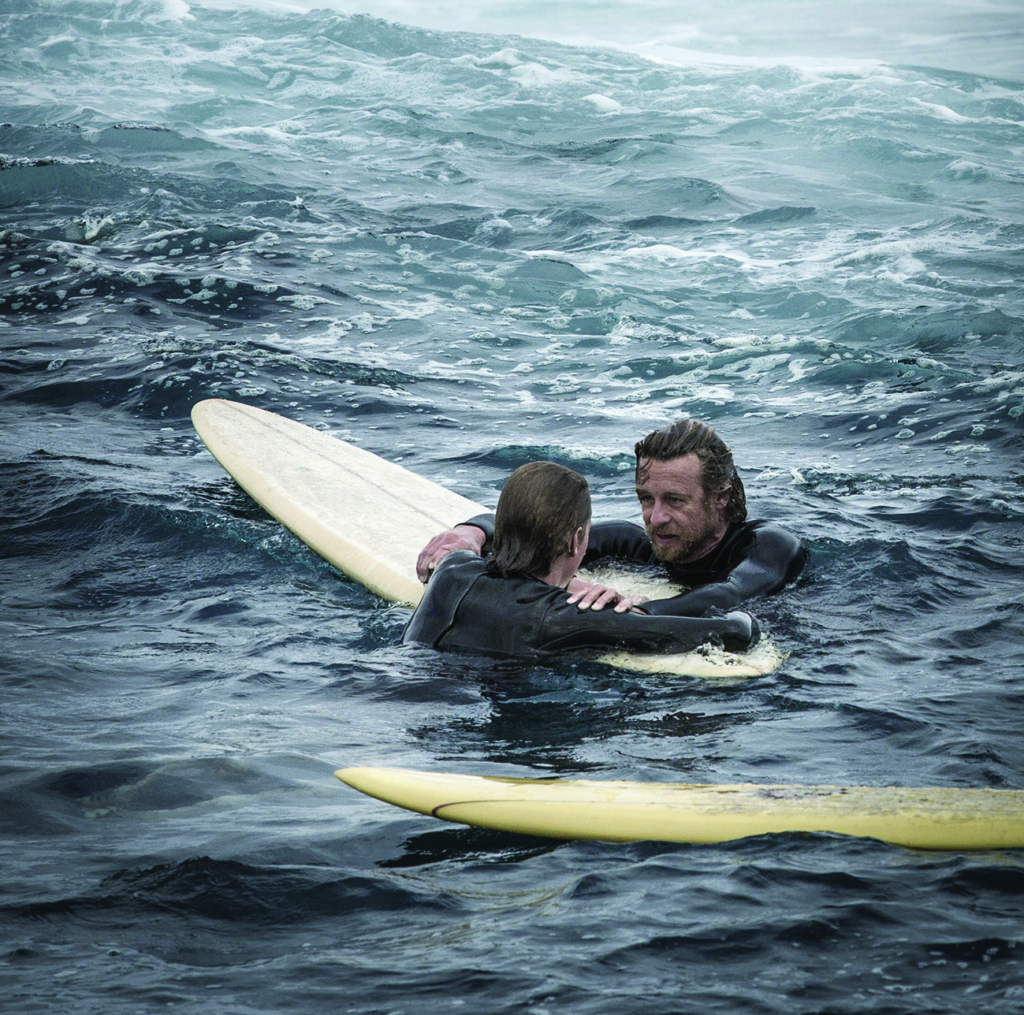
That’s heady material – hardly prime for cinematic adaptation. Experienced directors have chafed against the challenge of adapting Winton’s works in the past; Phillip Noyce sidelined his planned adaptation of Dirt Music, explaining, ‘A poetic novel is just difficult to translate into a movie.’[3]Phillip Noyce, quoted in Edward Douglas, ‘Interview: Director Phillip Noyce Tackles Science Fiction with The Giver’, Coming Soon.net, 11 July 2014, <http://www.comingsoon.net/movies/features/119592-interview-director-phillip-noyce-tackles-science-fiction-with-the-giver>, accessed 9 May 2018. But first-time feature director Simon Baker – best known for his acting work on the American television shows The Guardian and The Mentalist – tackled it nonetheless, not just directing but also co-writing, co-producing and starring in Breath (2017), his attempt to channel Winton’s work on the silver screen.
To his credit, Baker does an impressive job of capturing the poetry that Noyce spoke of. Baker’s film evokes the sense of wounded yearning that lingers in Winton’s words, the sense of life as a perpetually overcast day with only occasional glimpses of sunlight. Yet, while Baker retains the tone of the novel, the process of adaptation has stripped out the meaning of Winton’s text, trading ambivalence for a direct, simple tale of masculinity and fear.
Baker and cinematographers Marden Dean and Rick Rifici defy expectations by adopting a more muted, overcast palette. It’s a clever choice, suggesting both the haze of memory and Pikelet’s increasingly conflicted feelings about his surfing escapades with Sando and Loonie.
The hand of God
Both Winton’s novel and Baker’s adaptation are united by the obvious importance of surfing to their respective authors. During a Q&A following the film’s screening at the Gold Coast Film Festival, Baker expounded on his desire to make an authentic surfing film. As someone who has never surfed – let alone touched a surfboard – I can’t speak to the film’s authenticity in this respect. But it’s apparent from both texts that, for Winton and Baker alike, surfing represents something fearsome and beautiful, something ultimately unattainable.
In an important passage in the novel, father figure – and once-legendary surfer – Sando waxes rhapsodic about surfing at its most sublime: ‘Man, it’s like you’ve felt the hand of God.’[4]Winton, op. cit., p. 94. Baker recreates that scene pretty well word for word, with protagonist Pikelet (Samson Coulter) and best friend Loonie (Ben Spence) listening to Sando (played by Baker) with hushed awe as the trio drive away from a glorious day of surfing. The challenges of adaptation are clarified here: that notion of the ‘hand of God’ is invoked after Sando dismisses the purpose of recording such moments with a camera. ‘You don’t need any photo.’[5]ibid., p. 92.
Baker largely succeeds in taking on this challenge. Outside of one or two sequences – like Loonie triumphantly taming a tremendous wave as hair metal blazes away on the soundtrack – the film avoids the conventional, exciting aesthetics associated with surfing on screen. He keeps enough distance from the proceedings to suggest the power of the surf without directly depicting it. Notably, the surfing that precedes Sando’s lecture about photographs is kept entirely off screen; Baker cannily allows his audience to infer his teenage characters’ experiences through their exhilarated demeanour.
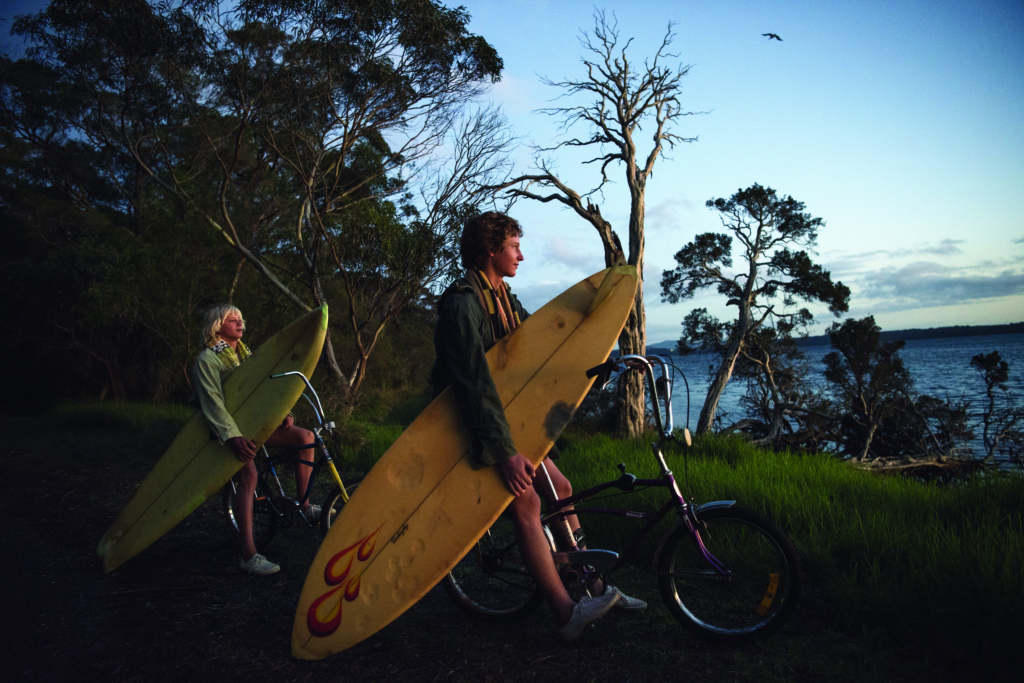
There’s no bright sun, glistening pecs nor shimmering blue seas here. Baker and cinematographers Marden Dean and Rick Rifici[6]Credited as ‘water cinematographer’; Rifici also worked extensively on the television series Lockie Leonard, likewise adapted from books by Winton. defy expectations by adopting a more muted, overcast palette. It’s a clever choice, suggesting both the haze of memory and Pikelet’s increasingly conflicted feelings about his surfing escapades with Sando and Loonie. Tonally, there’s a shadow of Winton’s poetry here: a sense of longing and loss that defies words. Breath is at its best by the ocean, where we trade words for waves.
That’s likely influenced by the participation of Coulter and Spence. Both untrained actors but professional surfers, they were selected by Baker and casting agent Nikki Barrett for their ability to surf as much as their ability to sell their characters.[7]Roadshow Films, Breath press kit, 2018, p. 6. Their inexperience is often a strength – it’s hard to imagine the tone of the film working with, say, Kodi Smit-McPhee gyrating on a fake surfboard in front of a green screen. But, while they successfully embody the spirit of their characters (meek and somewhat deranged, respectively), Coulter and Spence don’t always nail their line readings.
Still, the authenticity they bestow on the film justifies the trade-off, particularly as the adult actors shoulder the film’s more challenging emotions. Baker is strikingly successful at embodying the contradictions of Sando, who is, variously, an awe-inspiring hero, a modest father figure and a pathetic has-been. He reminds me of the titular figure in Kris Kristofferson’s ‘The Pilgrim, Chapter 33’ – ‘He’s a poet, he’s a picker / He’s a prophet, he’s a pusher / He’s a pilgrim and a preacher’.[8]Full disclosure: I’m only familiar with these lyrics via Taxi Driver (Martin Scorsese, 1976). Elizabeth Debicki, as Sando’s wife, Eva, is underused but evocative as a counterpoint to Sando’s optimism, overcome with quiet resignation and regret.
The standout performance is unquestionably that by Richard Roxburgh, playing the comparatively tiny role of Pikelet’s dad. Roxburgh’s wounded expression as his son is drawn into Sando’s web – and away from him – lends the film an atmosphere of loss not always present in the screenplay. The film’s best shot is almost too simplistic in its symbolism: we see Pikelet in bed, his father across the room from him, a surfboard between them. But Roxburgh’s quiet gravitas elevates the shot, softening its bluntness.
Rather than leaving us with the sense that Pikelet was irreparably damaged – even in modest ways – by his coming of age, the film wraps his experiences up with a neat bow, suggesting that these experiences have shaped him into the man he was always meant to be.
Gasping for air
Breath is a difficult novel to adapt for two reasons. The first is the specificity of its tone – something that, as discussed, Baker does an admirable if imperfect job of conveying in his film. The second is the looseness of the narrative. Winton’s book has a fairly conventional beginning-middle-end structure, bracketed by a flashback framework that’s omitted in the film, but it never really establishes any kind of tension nor forward momentum. The conflicts are primarily internal, with Pikelet facing a series of decisions – whether to surf a terrifying wave, whether to challenge Loonie’s behaviour and, most critically, whether to sleep with Eva – that challenge his self-image.
That kind of internal conflict doesn’t easily lend itself to cinema, so understandably Baker made some modifications when translating the text for the screen. On top of eliding the aforementioned flashback framing, the film places a stronger emphasis on Loonie and Pikelet’s relationship, and on fear as a theme rather than exploring the limits of experience. Unfortunately, those changes are largely to the detriment of the final product, doing little to add any narrative tension while eroding the enigmatic power of Winton’s novel. Each alteration is, in and of itself, relatively minor. But, taken together, they leave the film feeling somewhat adrift, especially for audiences unfamiliar with the source text.
That’s most apparent with the Eva–Pikelet storyline. Late in the film, Sando and Loonie go gallivanting around South-East Asia, leaving Eva by herself in the bush. To the strains of Fleetwood Mac, she seduces young Pikelet, soon recruiting him to strangle her for her pleasure. On screen, it’s a rushed, awkward sequence that feels entirely out of place: a perfunctory dash of sexual awakening with an inexplicable bit of kink thrown into the mix. On the page, it’s still rushed – the book accelerates through its final act with heady abandon – but the narrative awkwardness is balanced by the obvious thematic thrust of these scenes.
In Winton’s novel, it’s clear that Eva’s fixation on erotic asphyxiation is analogous to the young men’s striving for that great wave. It’s a way to test the limits of her body, to find pleasure in the extremes, to make up for her inability to ski.[9]Both film and novel establish that Eva was a competitive aerial skier, a pursuit cut short by a crippling leg injury. That’s further clarified by the novel’s prologue and epilogue alike; in the former, an older Pikelet, now working as a paramedic, stumbles upon the unfortunate aftermath of a young man’s attempt at autoerotic asphyxiation. In the book’s coda, we learn that Eva met her end in a similar way some years after her dalliance with Pikelet.
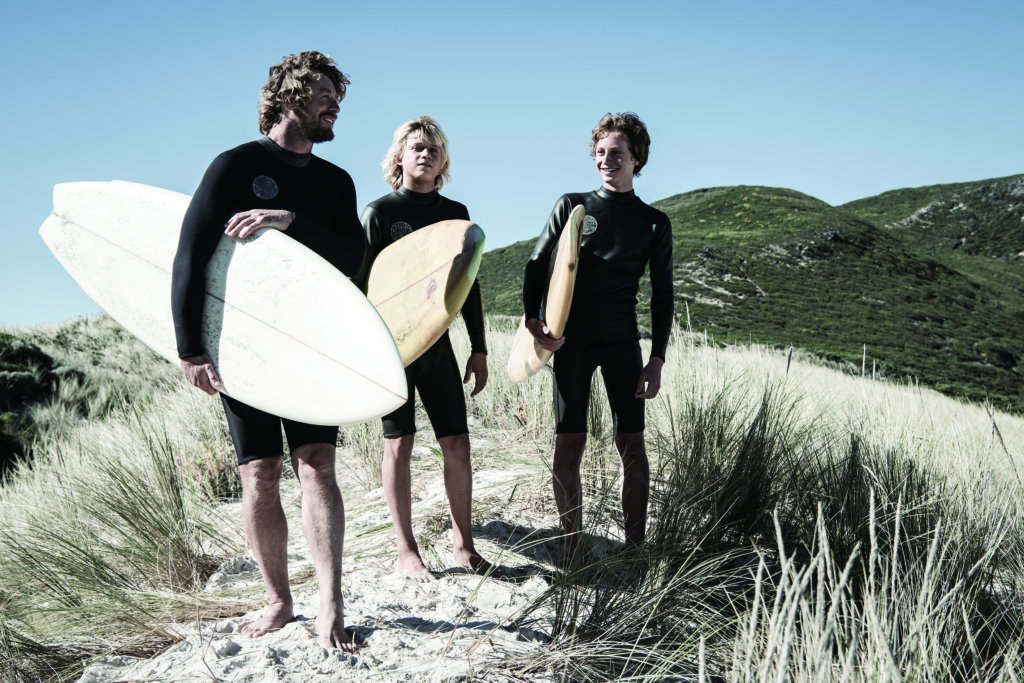
In the movie, without this information, these sex scenes come across as strange more than anything else. Without context or an indication of Pikelet’s interior monologue, it just doesn’t work; as ABC critic Jason Di Rosso has noted, Baker’s Breath ‘doesn’t translate the considerable time Winton spends describing how Pikelet sees [Eva] once they’ve become intimate: his desire for her, his indifference to her, his repulsion from her’.[10]Jason Di Rosso, ‘Breath Review: Simon Baker’s Directorial Debut Is a Nostalgic Tribute to Surf Culture but Has Rare Moments That Shine’, ABC News, 3 May 2018, <http://www.abc.net.au/news/2018-05-03/breath-review/9712184>, accessed 9 May 2018. The fact that the film doesn’t attempt to grapple with the aftermath of what is, after all, statutory rape is perhaps its greatest failure.
Almost as disappointing is how the film resolves the Pikelet–Loonie relationship. Loonie is a great character in film and novel alike – the kind of livewire larrikin that every Australian would have known at some point, prone to taking outlandish risks for the sheer thrill of it. He’s as captivating as he is infuriating, and Spence has just the right twinkle in his eye to allow us to understand why Pikelet would form a close friendship with someone with such a spiteful, competitive spirit.
As the boys spend more and more time with Sando, becoming formidable surfers in their own right, the competitiveness between Loonie and Pikelet curdles. Good-natured jibes twist into hurtful accusations of cowardice. In the book, Loonie comes to represent the kind of toxic masculinity that Winton has been railing against while promoting his latest novel, The Shepherd’s Hut, [11]See Hannah Reich, ‘Tim Winton Reflects on Masculinity and His Latest Novel, The Shepherd’s Hut’, ABC News, 1 May 2018, <http://www.abc.net.au/news/2018-03-27/tim-winton-reflects-on-masculinity-and-his-latest-novel/9587712>, accessed 9 May 2018. and, when the two boys part ways for good, it comes as a relief for both Pikelet and the reader. Baker, instead, grants Loonie a beatific halo; the last we see of him, he’s wearing a cheeky grin and offering a half-hearted apology of sorts to Pikelet.
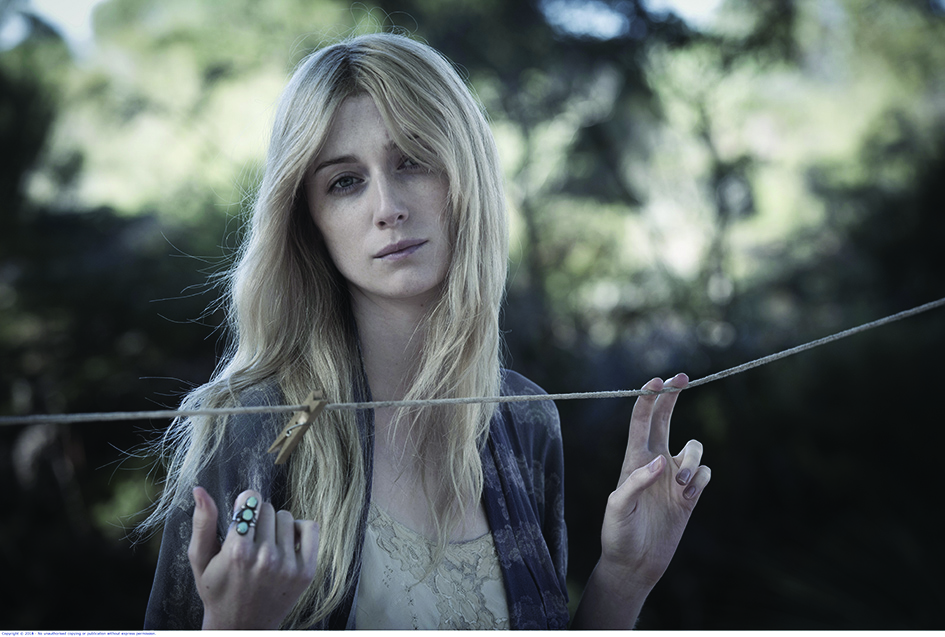
In the movie, as on the page, Loonie doesn’t last much longer, losing his life to a drug deal gone wrong after taking one risk too many. After learning of Loonie’s death, we return to an image of the two boys underwater in the local creek, clutching onto a tree root and holding their breath for as long as they can. In the book, it’s a silly prank; in the film, it feels like some attempt to create a spiritual bond between the two boys. Baker can’t resist imposing meaning on Loonie’s death, framing it as how he ‘helped [Pikelet] understand fear’.[12]Pikelet’s voiceover from early in the scene, as read by Winton himself; see Roadshow Films, op. cit., p. 21.
Indeed, fear is the thematic framework for much of the film. When Pikelet finally breaks off his relationship with Sando, the movie portrays it as a different kind of bravery, a way of re-establishing self-image. ‘It doesn’t make me a coward and it doesn’t make me ordinary,’ Pikelet tells Sando, rejecting the offer of one more death-defying surfing trip. ‘It’s just not for me.’ That idea of fear is used to tie the film together in a concluding voiceover, with Pikelet musing that ‘there’s fear in all of us. I know that now. It’s how you live with it that makes you who you are.’
The triteness, the irritating simplicity, of this message undercuts the ambiguity of the source text. Fear is an element in the novel, but only inasmuch as it’s inextricably caught up in the endeavour of challenging one’s physical and mental limits. Baker and Gerard Lee’s screenplay seems intent on reducing a complex reflection on identity, how we find ourselves in the liminal spaces of our limits, with the last breath in our lungs. Rather than leaving us with the sense that Pikelet was irreparably damaged – even in modest ways – by his coming of age, the film wraps his experiences up with a neat bow, suggesting that these experiences have shaped him into the man he was always meant to be.
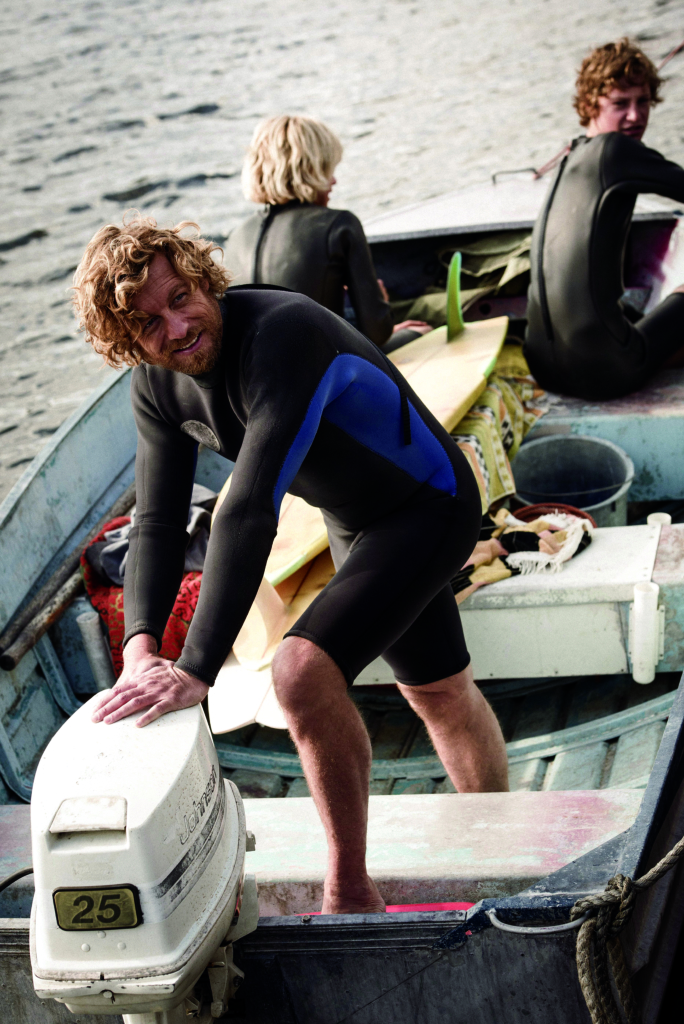
Breath is a novel that resists the familiar shape of coming-of-age narratives. Rather than viewing the past as a neat tapestry, in which every thread is woven together into a road map for adulthood, Winton regards the past as a frayed cloud of missed chances and mistakes, an irreducible web of memory. In adapting the story, Baker has reproduced this texture – but, by knitting these threads together, he’s created something more conventional and less satisfying. The end result is a formally formidable but emotionally unconvincing simulacrum of Winton’s novel.
Endnotes
| 1 | Tim Winton, Breath, Penguin Books, Camberwell, VIC, 2009, p. 234. |
|---|---|
| 2 | ibid., p. 234. |
| 3 | Phillip Noyce, quoted in Edward Douglas, ‘Interview: Director Phillip Noyce Tackles Science Fiction with The Giver’, Coming Soon.net, 11 July 2014, <http://www.comingsoon.net/movies/features/119592-interview-director-phillip-noyce-tackles-science-fiction-with-the-giver>, accessed 9 May 2018. |
| 4 | Winton, op. cit., p. 94. |
| 5 | ibid., p. 92. |
| 6 | Credited as ‘water cinematographer’; Rifici also worked extensively on the television series Lockie Leonard, likewise adapted from books by Winton. |
| 7 | Roadshow Films, Breath press kit, 2018, p. 6. |
| 8 | Full disclosure: I’m only familiar with these lyrics via Taxi Driver (Martin Scorsese, 1976). |
| 9 | Both film and novel establish that Eva was a competitive aerial skier, a pursuit cut short by a crippling leg injury. |
| 10 | Jason Di Rosso, ‘Breath Review: Simon Baker’s Directorial Debut Is a Nostalgic Tribute to Surf Culture but Has Rare Moments That Shine’, ABC News, 3 May 2018, <http://www.abc.net.au/news/2018-05-03/breath-review/9712184>, accessed 9 May 2018. |
| 11 | See Hannah Reich, ‘Tim Winton Reflects on Masculinity and His Latest Novel, The Shepherd’s Hut’, ABC News, 1 May 2018, <http://www.abc.net.au/news/2018-03-27/tim-winton-reflects-on-masculinity-and-his-latest-novel/9587712>, accessed 9 May 2018. |
| 12 | Pikelet’s voiceover from early in the scene, as read by Winton himself; see Roadshow Films, op. cit., p. 21. |
